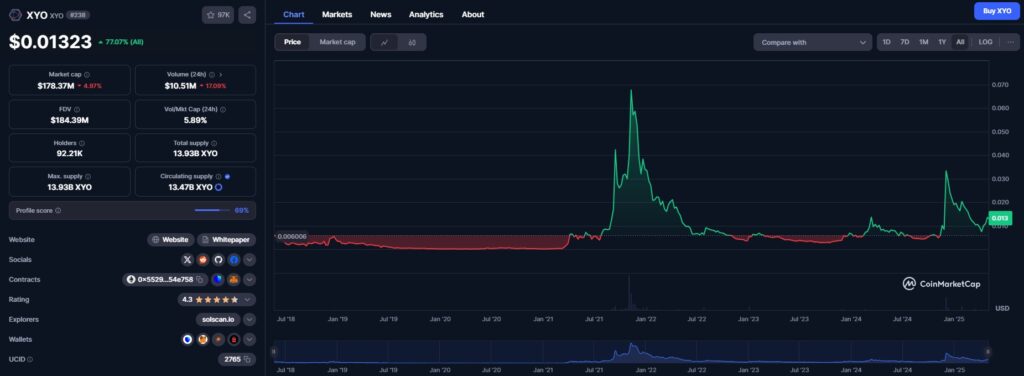In an exciting development within the cryptocurrency landscape, XYO Network has reached a remarkable milestone by integrating over 10 million nodes into its decentralized physical infrastructure network, known as DePIN. This achievement was highlighted by co-founder Markus Levin during a recent interview with Cointelegraph, emphasizing the significant participation of everyday users who are contributing valuable data in exchange for various rewards via the company’s mobile application, COIN.
Levin noted that the majority of these nodes come from mobile users rather than traditional crypto enthusiasts, with approximately 80% of XYO’s participants engaging with Web3 for the first time. This diverse group includes truck drivers, rideshare operators, delivery personnel, and healthcare workers, demonstrating a broad appeal that transcends the typical cryptocurrency demographic. Remarkably, he mentioned that 95% of these new users successfully engage with the platform after onboarding through the COIN app.
Since its launch of a layer-1 blockchain earlier this year, XYO has been actively collecting and validating data from its vast network of users. The platform rewards participants not only with its native XYO token, but also with popular cryptocurrencies like Bitcoin (BTC) and Ethereum (ETH), as well as non-digital rewards like gift cards. This strategy is part of a broader move to enhance user accessibility and expand the reach of their network.
“DePINs are poised to be one of Web3’s next major use cases, potentially bringing in millions of new users into the crypto space,” Levin stated, referencing a report from MV Global that outlines the growing importance of decentralized physical infrastructure networks in the future of blockchain technology.
In recent news, XYO has also made strides in connecting its token to the Solana blockchain, a strategic move aimed at broadening its user base. Currently, the market capitalization of XYO is estimated to be around $180 million, as reported by CoinMarketCap. As part of its growth strategy, XYO plans to leverage the data collected through its nodes across various industries, ranging from real-world assets to gaming, thus ensuring sustainability and ongoing revenue generation for its ecosystem.
Key Points on XYO Network and Decentralized Infrastructure
Here are the main aspects of XYO Network’s progress and its implications for users:
- 10 Million Nodes:
XYO Network has successfully onboarded over 10 million nodes, primarily consisting of mobile users.
- Non-Crypto Users:
Approximately 80% of XYO users are newcomers to cryptocurrency, including professions like truckers, rideshare drivers, and nurses.
- Conversion Rate:
A significant 95% of users convert to active participants after onboarding, suggesting a strong user experience.
- Rewards System:
Users are incentivized with points redeemable for native XYO tokens, BTC, ETH, or gift cards in exchange for providing data.
- Market Capitalization:
The XYO token boasts a market cap of around $180 million as of May 2022.
- Layer-1 Blockchain:
XYO launched a layer-1 blockchain in January, focusing on compiling real-world data onto a public ledger.
- Decentralized Infrastructure Networks (DePINs):
XYO is part of a larger trend towards Decentralized Physical Infrastructure Networks, which aim to improve various industries and onboard more users into crypto.
- Revenue Model:
XYO generates income from data collection in diverse sectors and uses a portion to buy back its tokens, promoting a sustainable ecosystem.
“DePINs are seen as the next big use case in Web3, with immense potential for growth and user engagement.” – MV Global
These points highlight XYO Network’s innovative approach in the decentralized space and its potential impact on individuals seeking to engage with the crypto ecosystem without prior experience. Users can benefit by participating and earning rewards while contributing valuable data, bridging the gap between traditional sectors and digital innovation.
XYO Network’s Massive Onboarding Success: A Paradigm Shift in DePIN
XYO Network has achieved an impressive milestone by integrating over 10 million nodes into its decentralized physical infrastructure network, a clear showcase of its competitive edge in the rapidly evolving DePIN landscape. With a substantial proportion of these nodes being non-crypto natives, XYO stands out as a trailblazer that can bridge the gap between traditional users and the blockchain world.
Competitive Advantages: The network’s ability to attract approximately 80% of its users from outside the crypto sphere is particularly noteworthy. By targeting everyday professionals such as truckers, rideshare drivers, and healthcare workers, XYO has crafted a unique approach that fosters inclusivity within the Web3 ecosystem. This is reinforced by a remarkable 95% conversion rate after onboarding, indicating that the COIN app is not only user-friendly but also effectively incentivizes participation through tangible rewards like cryptocurrency and gift cards.
Furthermore, XYO’s innovative strategy includes bridging its native token to the Solana blockchain, which enhances its visibility and accessibility. This connection to a well-established blockchain can facilitate quicker transactions and broaden its market presence, appealing to a wider audience. Given the current market cap of around $180 million, there is clear growth potential as the demand for decentralized infrastructures increases.
Competitive Disadvantages: However, XYO’s endeavors are not without challenges. As the DePIN sector grows, competition is intensifying, with numerous projects emerging to decentralize real-world systems concurrently. While XYO has set itself apart, it must continue to innovate and maintain user engagement against rivals who may also leverage user-friendly applications and attractive incentives. Additionally, the reliance on the COIN app for onboarding could pose risks—any technical issues or misaligned user expectations might hamper growth.
This success story can benefit a diverse array of stakeholders, from individual users looking to derive additional income from their data to businesses seeking more accurate real-world data analytics. However, traditional data collection companies may find themselves at a disadvantage, as XYO’s disruptive model directly competes with their existing frameworks. Moreover, if users experience any hurdles in understanding or utilizing the blockchain aspect, this could deter broader acceptance and adoption.
In the ever-evolving landscape of crypto and decentralized applications, XYO Network’s onboarding success highlights both the significant opportunities and potential pitfalls within the DePIN market. Only time will tell how successfully it can navigate this exciting yet challenging terrain.













